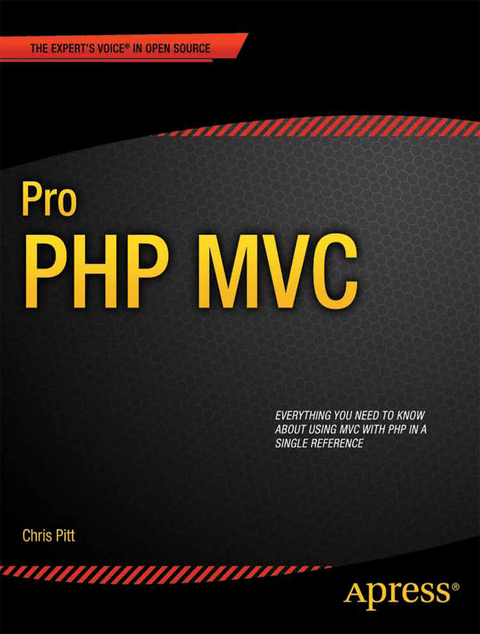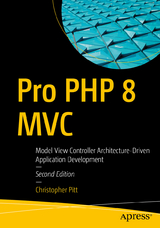
Pro PHP MVC
Seiten
2012
|
1st ed.
Apress (Verlag)
978-1-4302-4164-5 (ISBN)
Apress (Verlag)
978-1-4302-4164-5 (ISBN)
- Titel erscheint in neuer Auflage
- Artikel merken
Zu diesem Artikel existiert eine Nachauflage
Model View Controller (MVC) is becoming the definitive architecture of website development frameworks due to the stability, extensibility and predictability it lends to development. It is not just the primary separation of database, business logic and interface components, but includes a wide range of considerations for building high-performing, scalable and secure applications.
Deciding which MVC framework best suits the project you are about to begin is one of the biggest challenges you'll face as a developer. If you are part of a team, this decision has probably already been made for you; but in any event, you'll need to know how (and why) the framework authors made it work the way it does.
Pro PHP MVC looks at the building blocks that make any good MVC framework, and how they apply to PHP. It exposes all considerations that many developers take for granted when using a popular framework, and teaches you how to make the framework your own.
Over the course of reading this book, you will learn the theoretical implications of the choices you would make when writing your own MVC framework, and how to put the pieces together in a cohesive package. We take a look at the highly modular Zend Framework—how to use its collection of loosely coupled classes to build a unified system. We also look at CakePHP, learning from its automated build system (Bakery) and highly intuitive approach to rapid development. This book will lay bare all the secret parts of MVC for you.
Deciding which MVC framework best suits the project you are about to begin is one of the biggest challenges you'll face as a developer. If you are part of a team, this decision has probably already been made for you; but in any event, you'll need to know how (and why) the framework authors made it work the way it does.
Pro PHP MVC looks at the building blocks that make any good MVC framework, and how they apply to PHP. It exposes all considerations that many developers take for granted when using a popular framework, and teaches you how to make the framework your own.
Over the course of reading this book, you will learn the theoretical implications of the choices you would make when writing your own MVC framework, and how to put the pieces together in a cohesive package. We take a look at the highly modular Zend Framework—how to use its collection of loosely coupled classes to build a unified system. We also look at CakePHP, learning from its automated build system (Bakery) and highly intuitive approach to rapid development. This book will lay bare all the secret parts of MVC for you.
A bio is not available for this author.
Introduction
Foundation
Base
Configuration
Caching
Registry
Routing
Templates
Database
Models
Testing
Structure
Bootstrapping
Registration + Login
Settings
Search
Sharing
Photos
Extending
Administration
Testing
CodeIgniter: Bootstrapping
CodeIgniter: MVC
CodeIgniter: Extending
CodeIgniter: Testing
Zend Framework: Bootstrapping
Zend Framework: MVC
Zend Framework: Extending
Zend Framework: Testing
CakePHP: Bootstrapping
CakePHP: MVC
CakePHP: Extending
CakePHP: Testing
Appendix A: Setting Up a Web Server
| Erscheint lt. Verlag | 1.11.2012 |
|---|---|
| Zusatzinfo | XXV, 500 p. |
| Verlagsort | Berlin |
| Sprache | englisch |
| Maße | 191 x 235 mm |
| Gewicht | 923 g |
| Themenwelt | Mathematik / Informatik ► Informatik ► Betriebssysteme / Server |
| Mathematik / Informatik ► Informatik ► Software Entwicklung | |
| Mathematik / Informatik ► Informatik ► Web / Internet | |
| ISBN-10 | 1-4302-4164-0 / 1430241640 |
| ISBN-13 | 978-1-4302-4164-5 / 9781430241645 |
| Zustand | Neuware |
| Informationen gemäß Produktsicherheitsverordnung (GPSR) | |
| Haben Sie eine Frage zum Produkt? |
Mehr entdecken
aus dem Bereich
aus dem Bereich
der Ausbildungsbegleiter
Buch | Hardcover (2023)
Rheinwerk (Verlag)
CHF 55,85



